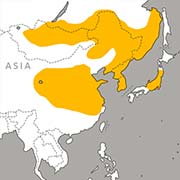Azure-Winged Magpie
Cyanopica cyanus
You Can Find This Animal in the Children's Zoo
Calling all magpies!
The azure-winged magpie's call is an unmistakable krarrah-kwink-kwink-kwink
Save
Save
Save
Save
Save
Save
Save
Save
Save

Geographic Range:

Class: Aves
Order: Passeriformes
Family: Corvidae
Genus: Cyanopica
Species: cyanus
As its name suggests, this active songbird is distinguished by its pale grey-blue wings and tail. Closely related to ravens and crows, azure-winged magpies are found in the wild in two very different regions: southern Europe, especially Spain and Portugal, and east Asia.
Appearance:
Azure-winged magpies are black-capped and billed, with a white neck leading to a light grey stomach and back. Their wings and tails are light blue.
Diet:
The magpie is omnivorous but most of its diet consists of nuts and seeds, particularly acorns. The magpie will also eat insects and their larvae, as well as other birds' eggs.
Reproduction:
Sexually mature at one year, females will lay up to nine eggs, which are incubated for 15 days. They prepare an arboreal nest made of sticks and lined with grasses, moss and down. Both parents care for the chicks for up to seven months.
Behavior:
Magpies live in loose communities that forage, nest and raise their young close together, allowing them to be better aware of predators. During courtship, the male often presents the female with food items and will shake his wings while lowering his head.
Role in their habitat:
The magpie regulates insect populations and helps disperse plant seeds. It is prey for raptors and egg thieves.
Habitat/Range:
The two populations of the azure-winged magpie are geographically quite distant from one another. The Iberian population lives in Spain and Portugal, while the Asian population inhabits China, Korea, Mongolia, Taiwan and Japan. Though versatile, they prefer temperate or coniferous forests. Currently, researchers are working to determine if the Asian and Iberian populations are distinct species or subspecies.
Median Life Expectancy:
15 years
The azure-winged magpie's call is an unmistakable krarrah-kwink-kwink-kwink
At Franklin Park Zoo:
At Stone Zoo:

